
Related
Guests
- Marc Lamont HillAfrican-American studies professor at Morehouse College, author of Nobody: Casualties of America’s War on the Vulnerable, from Ferguson to Flint and Beyond.
- Graham Weatherspoonretired detective with the New York City Police Department. He is also a board member of the Amadou Diallo Foundation.
The shooting in Dallas that has so far left five police officers dead and six others wounded was carried out by at least one sniper, who began shooting around 8:45 p.m. local time toward the end of a peaceful protest demanding an end to police brutality. In recent days, protests against police brutality and state violence have swept the country, in the wake of the fatal police shootings of Alton Sterling in Baton Rouge, Louisiana, and Philando Castile in Falcon Heights, Minnesota. We speak with Marc Lamont Hill about the movement against police brutality, who said, “I cannot allow Dallas to deter me from a principled critique of state violence. Far more people have died at the hands of law enforcement this year than have died as law enforcement officers.”
Transcript
AMY GOODMAN: Marc Lamont Hill?
MARC LAMONT HILL: I think we absolutely have to engage this question of race. There’s no doubt about that. We also have to engage the question of power, because everyday citizens don’t have equal footing with the state in order to battle the state, in the same way that I would argue Palestinians and Israelis don’t have the same footing. Right? One is in a position of power, one is an occupying force; one is not. The same thing with law enforcement in our communities: One is an occupying force, and one is not. So we have to look at that, as well. And so, what—and I also want to be careful that we don’t link what happened last night to the Black Lives Matter movement or the anti-state violence movement, resistance movement, because—
GRAHAM WEATHERSPOON: Not at all. Not at all.
MARC LAMONT HILL: And I know you’re not doing that, but that has been the instant kind of easy media narrative, and it becomes a sort of straw man. And that’s very dangerous.
AMY GOODMAN: I found, in watching the coverage of the horror that took place last night, people saying, “Oh, you know, look at what happens: You’re protesting the police, and then they’re killed.” But was it really protesting the police, or is it a peace movement? It is for peace. There’s no contradiction in being opposed the killing of police officers and the killing of young black men who were stopped for their taillight being out.
MARC LAMONT HILL: Absolutely. You know, all—I would argue any good revolutionary movement or radical movement or progressive movement is driven by humanistic principles. I have worked with, I have studied, I have organized with, I have marched with, and I have covered as a journalist the Black Lives Matter movement and anti-state violence activists all around the country for the last two years. And not once has the question of shooting police come up. In fact, when we go to these rallies and we see people beginning to cause problems, we try to weed them out.
GRAHAM WEATHERSPOON: Yes.
MARC LAMONT HILL: When I was in Ferguson, the biggest thing—problem we had was that some of the sort of extremists would come in, and particularly anarchists, and would try to kind of colonize the movement and turn it into something that it’s not. As the Black Lives Matter folks said on Twitter today, this is a movement driven by a sense of dignity, a sense of peace, a sense of purpose. We want to end violence against the state. We don’t want to reverse relations of oppression. We don’t want to turn into killers. We want to stop the practice of killing, because we don’t think the state has the moral authority to kill us, and we don’t want to go around killing cops.
So, even if there is an outlier who happens to be an activist—and I don’t know that to be the case, but even if there were an outlier who was somehow considered—self-identified as an activist and they shot a police officer, that’s not a reflection on the movement, that’s not a reflection on our principles, any more than the Klan members are a reflection of the tea party. There are certainly Klan members in the tea party, but that’s not the organizing principle of the movement, and certainly that’s not the case for Black Lives Matter or any of these other kind of anti-violence movements.
AMY GOODMAN: The video of the—one of the snipers last night with—I mean, so packed with ammunition, it was falling out of his pocket—
MARC LAMONT HILL: Was falling out.
AMY GOODMAN: —the commentary around it, the way he was dancing around the cement pole, targeting police, that he had some kind of military training.
MARC LAMONT HILL: Oh, there’s no doubt about that. I’ve spoken to experts, as well. What he was doing tactically suggests some sort of military or paramilitary training. This isn’t just a rogue killer. This isn’t your everyday, garden-variety shooter. This is someone who had experience, someone who had training. But again, that could be a range of things, and I don’t want to speculate on what that could be, but that’s why we need to find out. But again, it would probably be a bizarre stretch of logic to assume that this was some random activist who decided to go on a cop-killing spree. That’s not—again, that’s not what we do.
AMY GOODMAN: The image of the police officers lined up—black, white—at the Parkland Hospital—
MARC LAMONT HILL: Yeah.
AMY GOODMAN: —the hospital where John F. Kennedy was brought—
MARC LAMONT HILL: Yeah.
AMY GOODMAN: —was quite stunning this morning.
MARC LAMONT HILL: It was incredibly stunning. And again, it speaks to who we are as human beings when we see people die, when we see tragedy, when we see children who lose family members. All of this is a profound tragedy, and we should respond to it as a profound tragedy. But what we can’t do, at the same time, is conflate two very different things. On the one hand, there are five officers who died, six more who are in critical condition. We pray for all of them. I pray for their families. I want them to be OK. But I cannot allow that to detour me from a principled critique of state violence, because far more people have died at the hands of law enforcement this year than died as law enforcement officers. And I’m not having an oppression derby here.
AMY GOODMAN: And more died this year than last year at the hands of police.
MARC LAMONT HILL: Oh, that’s exactly right. That’s exactly right. And so, again, I am sensitive to the loss of life. I am profoundly sad about what happened. It is a—it’s a tragedy. But that can’t stop us from doing the work we need to do in fighting for justice against state violence.
AMY GOODMAN: This issue of guns—President Obama said from Warsaw, “We also know when people are armed with powerful weapons, unfortunately, it makes attacks like these more deadly and more tragic.” Now, you’re a former cop on the street, a former detective. What about this, the high-powered weapons they had?
GRAHAM WEATHERSPOON: Yeah, there is no need for people to have high-powered weapons. They’re not hunting. Those are assault weapons. They’re used for combat situations. They’re not to protect your home, necessarily. You have a handgun. I’m not against people having a handgun legally, but we have to understand, in this country, money motivates a lot of things. And unfortunately, money is the god of this country. So, as money is generated, politicians respond one way or the other. We have no need for assault rifles. We’re not hunting bear, we’re not hunting elk or anything else. Those days are long gone in this country. It was 250 years ago. That is not the time that we’re living in now. There is no need for people to have 7.62 NATO rounds, 223 ammo. That’s high-velocity ammo. You are not simply protecting yourself. You are out there with a high-capacity magazine. You’re out there taking people. You’re a killer. You’re a killer. Yes, you know, people like to go and shoot and target practice. That’s great. But there’s a limit to everything. My pastor says anything to the extreme becomes error. So, it’s best to stay, if we can, near the middle. But these, these weapons? AK-47s and such? There’s no need for them.
AMY GOODMAN: We’re going to break and come back to this discussion, and we’ll stay with Graham Weatherspoon, retired detective here at the New York City Police Department, and Marc Lamont Hill, a professor, journalist, author of a new book out this week, Nobody: Casualties of America’s War on the Vulnerable, from Ferguson to Flint and Beyond. But we’re going to Baton Rouge, Louisiana, where we’ll be joined by the head of the NAACP there, Michael McClanahan. We’ll be talking about Alton Sterling and what’s coming next. Stay with us.
NEXT
Baton Rouge NAACP President Demands Arrest of Police Officers Who Killed Alton Sterling

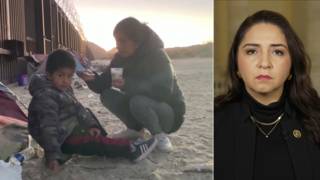
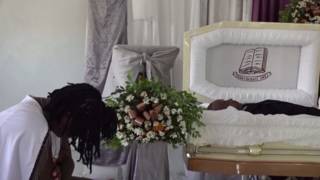
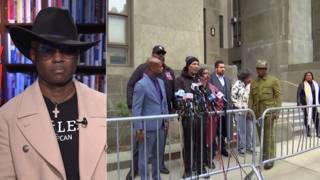
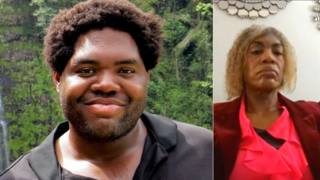





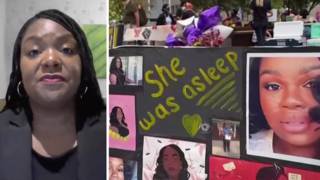
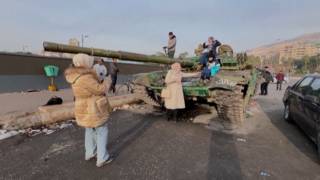
Media Options